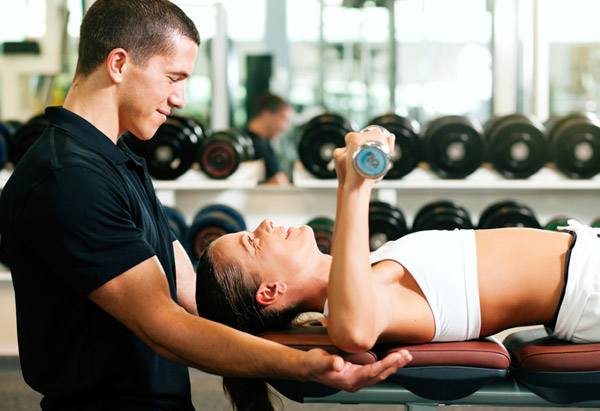20 Ways to Win at Losing Weight
Hollywood trainers from The Biggest Loser share their strategies.

Image: Thinkstock
The pure mathematics of weight loss is simple—eat less, move more—but if knowing that were all it took, everyone would be in great shape. Los Angeles–based personal trainers Bob Harper and Jillian Michaels have been helping to define the bodies of celebrities like Gwyneth Paltrow, Ellen DeGeneres, and Laura Dern, and they've also changed the lives of contestants on NBC's weight loss reality show, The Biggest Loser. Michaels is co-owner of Sky Sport and Spa. Here's what they know about diet and fitness success.
1. There's no one secret to being thin.
Losing weight and keeping it off, says Jillian Michaels, "requires a holistic approach that combines proper diet, good workouts, knowing why you overeat, and understanding how to push yourself toward change." The desire to change, she adds, really has to come from inside. "Sometimes you've got to have hit bottom, like realizing you can't play tag with your kids without getting out of breath," Jillian says. "If you're not ready for something new, no matter what you try, it's not going to work."
2. Don't blame your genes.
Yes, everyone is built differently, and some of us gain weight more easily than others. But "to say, 'I can't make any improvement because I have fat genes' is b.s.," says Jillian. "It's not true, and it's disempowering. No matter what your genes are, you have the ability to make the right choices about eating and exercise."
3. Cut yourself some slack.
The main thing is to make peace with your body before you try to change it, says Bob Harper. "Okay, you're overweight. But how great that you've decided to do something about it! Accepting where you are at the moment takes away the white-knuckle feeling that can sabotage you fast: 'I've got to lose weight! I've got to! Damn, I didn't lose any weight today. I've failed! Forget it, I won't even try anymore.'"
4. Study up.
Before you lift a toe, do some legwork. "You can learn about nutrition and diets on Web sites like howstuffworks.com or through books like Nutrition for Dummies," says Bob. Preparation helps you train wisely, too. "You can't just jump into an exercise program without knowing what you're doing," says Jillian. "At best you'll waste your time; at worst you could get injured." Find a beginner class or trainer to teach you the nuts and bolts. Or use books, fitness magazines, and videos. "Crunch Fitness puts out some awesome books that show all the basics," she says, "including Beginner's Luck, by Brad Hamler, and Perfect Posture, by Scott G. Duke."
5. Keep an honest food journal.
"It's essential," Jillian insists. "You need to track what you eat in detail. Not 'peanuts,' but how many peanuts. What time of day? And why are you eating just then? Writing it down makes you accountable and aware, and it helps you identify the mistakes you're making. Maybe your blood sugar is fluctuating through the day. Maybe you're skipping meals. Maybe you feel like you're not eating that much but, when you add it up, it comes to 2,500 calories a day."
Tip #6: Experiment to find your own diet
1. There's no one secret to being thin.
Losing weight and keeping it off, says Jillian Michaels, "requires a holistic approach that combines proper diet, good workouts, knowing why you overeat, and understanding how to push yourself toward change." The desire to change, she adds, really has to come from inside. "Sometimes you've got to have hit bottom, like realizing you can't play tag with your kids without getting out of breath," Jillian says. "If you're not ready for something new, no matter what you try, it's not going to work."
2. Don't blame your genes.
Yes, everyone is built differently, and some of us gain weight more easily than others. But "to say, 'I can't make any improvement because I have fat genes' is b.s.," says Jillian. "It's not true, and it's disempowering. No matter what your genes are, you have the ability to make the right choices about eating and exercise."
3. Cut yourself some slack.
The main thing is to make peace with your body before you try to change it, says Bob Harper. "Okay, you're overweight. But how great that you've decided to do something about it! Accepting where you are at the moment takes away the white-knuckle feeling that can sabotage you fast: 'I've got to lose weight! I've got to! Damn, I didn't lose any weight today. I've failed! Forget it, I won't even try anymore.'"
4. Study up.
Before you lift a toe, do some legwork. "You can learn about nutrition and diets on Web sites like howstuffworks.com or through books like Nutrition for Dummies," says Bob. Preparation helps you train wisely, too. "You can't just jump into an exercise program without knowing what you're doing," says Jillian. "At best you'll waste your time; at worst you could get injured." Find a beginner class or trainer to teach you the nuts and bolts. Or use books, fitness magazines, and videos. "Crunch Fitness puts out some awesome books that show all the basics," she says, "including Beginner's Luck, by Brad Hamler, and Perfect Posture, by Scott G. Duke."
5. Keep an honest food journal.
"It's essential," Jillian insists. "You need to track what you eat in detail. Not 'peanuts,' but how many peanuts. What time of day? And why are you eating just then? Writing it down makes you accountable and aware, and it helps you identify the mistakes you're making. Maybe your blood sugar is fluctuating through the day. Maybe you're skipping meals. Maybe you feel like you're not eating that much but, when you add it up, it comes to 2,500 calories a day."
Tip #6: Experiment to find your own diet



